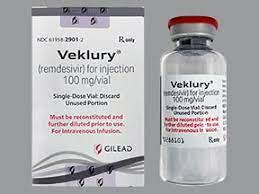
Gilead Sciences, Inc. (Nasdaq: GILD) has reported positive findings from several studies related to COVID-19, which will be presented at the 33rd European Congress of Clinical Microbiology & Infectious Diseases (ECCMID). One Phase 3 clinical trial showed that Veklury® (remdesivir) was well tolerated by patients with moderate to severe renal impairment. In addition, a retrospective real-world study indicated that Veklury® treatment was linked to a reduced risk of death from COVID-19 in cancer patients. Another real-world analysis indicated that Veklury® use was associated with a lower risk of hospital readmission in immunocompromised COVID-19 patients. Furthermore, a Phase 1 study investigating the safety, tolerability, and pharmacokinetics (PK) of obeldesivir, formerly known as GS-5245, a new oral compound currently being developed by Gilead for the treatment of SARS-CoV-2 infection, demonstrated that obeldesivir achieved the expected therapeutic plasma concentrations required for the treatment of COVID-19.
The breadth of clinical and real-world evidence data presented at ECCMID further support the strong efficacy and safety profile of Veklury. Since the beginning of the pandemic, Veklury has played a critical role in the treatment of hospitalized patients with COVID-19. The real-world data further demonstrates its role in reducing mortality and hospital readmission rates in vulnerable patient populations, including people living with cancer and other immunosuppressed conditions.
Frank Duff, MD, Senior Vice President, Virology Therapeutic Area Head, Gilead Sciences.
Study Results
A Phase 3 study (REDPINE) evaluated Veklury’s safety in hospitalized COVID-19 patients with reduced kidney function. The trial included 243 adult participants with confirmed COVID-19 and renal impairment, with 37% having acute kidney injury (AKI), 26% having chronic kidney disease (CKD) and 37% having end stage kidney disease (ESKD). Participants were randomized 2:1 to receive Veklury or placebo in addition to standard care, with 163 receiving Veklury and 80 receiving placebo. No new safety signals were identified and no additional adverse reactions were observed in 163 hospitalized patients with AKI, CKD, or ESKD receiving Veklury for up to 5 days.
In the second study study, immunocompromised patients treated with Veklury had a lower risk of hospital readmission at both 30- and 60-day time periods. The study analyzed 4,664 patients, with 2,332 receiving Veklury treatment and the remaining serving as matched controls. Results showed that during the Delta wave, patients treated with Veklury had a 16% lower 60-day readmission rate, and during the Omicron wave, a 13% lower rate, compared to the matched controls. These results further confirm previous real-world evidence presented at CROI that demonstrated the use of Veklury was associated with a reduced risk of 30-day all-cause readmission.